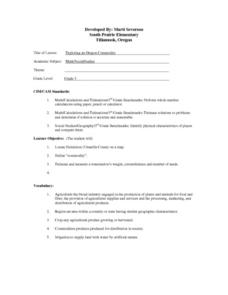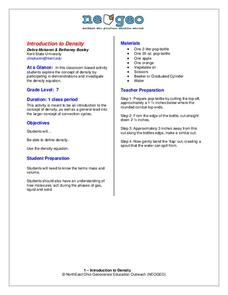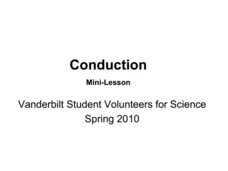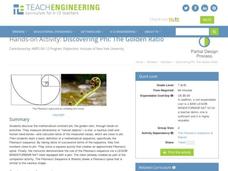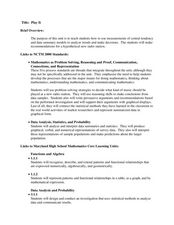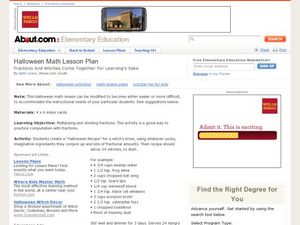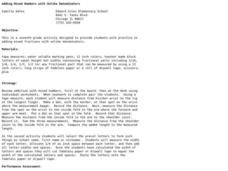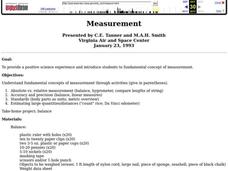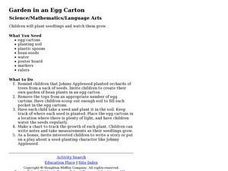Curated OER
Exploring and Oregon Commodity
A fun (and delicious!) lesson teaches measurement to your third graders. They work in small groups to first predict, then to measure the weight, circumference, and number of seeds found in a watermelon. Everyone gets to eat watermelon...
Curated OER
Introduction to Statistics: Mean, Median, and Mode
Students explore the concepts of mean, median, and mode. They develop an understanding and familiarity with these concepts. Students explore mean and median in an efficient way. Students explore three different measures of center.
NorthEast Ohio Geoscience Education Outreach
Introduction to Density
Seventh grade scientists weigh in on the concept of density. In a nutshell, they participate in the following activities:
Measurement of the mass and volume of fruit in order to compare densities
Measurement of the mass of oil and water...
Curated OER
Soil Porosity, Moisture Content, pH, and Density
This lab activity does not have to be done with AP environmental scientists. It can also be done with middle to high school earth scientists. The procedures aren't complex. Learners determine the density of dry and wet sand in order to...
Curated OER
Heat and Conduction
This simple activity is ideal for upper elementary learners when studying physical science. Using their sense of touch to describe how hot something feels, and then comparing their observations to thermometer measurements, they discover...
Teach Engineering
Discovering Phi: The Golden Ratio
Fe, phi, fo, fum. This activity leads pairs to find the ratio of consecutive terms of the Fibonacci sequence. The pairs find that the Fibonacci sequence can be found in many places. A discussion with the class shows that the ratios found...
Curated OER
What Floats Your Boat?
This open-ended boat building exercise is meant to be part of a three-lesson series on ships. Links to the other two lessons are included. This particular part is mostly a group lab activity in which they build a boat, find its load line...
Curated OER
Play It
There are a number of activities here that look at representing data in different ways. One activity, has young data analysts conduct a class survey regarding a new radio station, summarize a data set, and use central tendencies to...
Curated OER
And You Thought Gasoline Was Expensive!
Students carry out a cost analysis. In this comparative math lesson, students compare the cost of equal measures of gasoline to mouthwash, house paint, fruit juice, white-out, and other liquids.
Curated OER
Halloween Math Lesson Plan
Students practice their multiplication and division by creating a Witches Brew. In this holiday math lesson, students utilize Halloween style ingredients to create a fun edible treat for themselves. Students practice their measuring...
Curated OER
How Much Water is in That River?
Students practice measurement using the Hudson River. They calculate the discharge measurement at a location on the Hudson River using ingenuity and a topographic map.
Curated OER
One Hundred Things
Learners practice estimating by handling items in groups of ten. They visualize how much space 100 items, such as pennies, peas, or beans, will take up after holding 10 of them. Learners measure the difference in volume between 10 and...
Curated OER
Your Energy Balance Goal!
This is the last lesson in the series put out by Together Counts on health. This activity has youngsters setting goals to keep their energy balanced by making excellent eating and activity choices. They may need a little help making...
Curated OER
The Crash Scene
Fifth graders explore geography by participating in a mapping activity. In this engineering lesson, 5th graders identify the differences between latitude and longitude and practice locating precise points on a globe or map. Students...
Curated OER
Blast Off
In this physical science exploration, small groups place a piece of antacid tablet into a film canister and step back to time how long it takes for the top to pop. They repeat the activity, altering either the amount or temperature of...
Curated OER
Let it Rain
In this home activity worksheet, 3rd graders will focus on precipitation. Students will make a rain gauge and respond to 2 short answer questions about what they have observed.
Curated OER
Reading the River
In collaborative groups, young ecologists measure the temperature, pH, and dissolved oxygen for three different freshwater samples. They examine each sample with a microscope and record observations on the microorganisms in the pond...
Curated OER
Lipstick Chromatography/Ink Chromatography
Junior crime scene investigators are instructed in two different chromatography exercises. For female suspects, they separate and compare lipstick pigments. For male suspects, they separate and compare ink samples. A data sheet is...
Curated OER
Adding Mixed Numbers with Unlike Denominators
Seventh graders practice measuring skills as they add mixed fractions. In this fractions lesson, 7th graders measure the distance from their wrist to the tip of their finger, record the measurement, and repeat this procedure with other...
Curated OER
Measurement
Students experience a positive science experiment and study fundamental concepts of measurement.
Curated OER
Intersecting Lines and Segments of Measures
Mathematicians measure intersecting lines-and circles, and create chords. In this geometry lesson, students explore interrior and exterior chords created by tangent and secant lines. These segments can be inside the circleor outside the...
Curated OER
Garden in an Egg Carton
Students investigate the growth of seedlings planted in egg cartons in the classroom. Measurements are taken as the plants grow and charts created to organize the data.
Curated OER
Make A Rain Gauge
Students explore mathematics by participating in a nature measurement activity. In this rain lesson, students discuss the appropriate methods used in order to measure rain downpour. Students utilize a plastic bottle, tape, stones and a...
Curated OER
Angle Measures-90, 180, 270 and 360 Degrees
In this angle measurement worksheet, students complete 4 multiple choice problems, determining whether given angles measure 90, 180, 270 or 360 degrees. A reference web site is given for additional activities.


